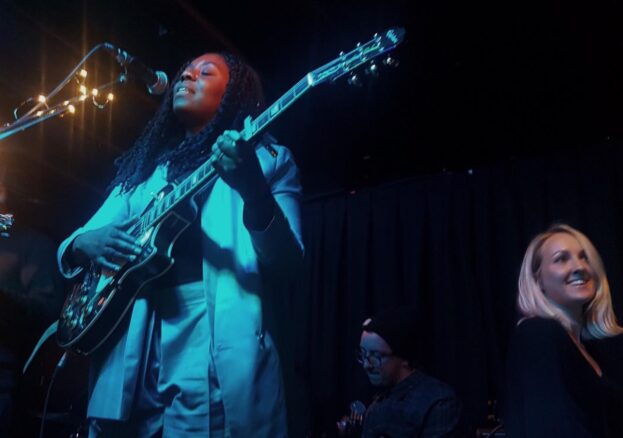
In 2017 British/Jamaican/Nigerian singer-songwriter Bianca Rose released her debut album ‘No Fear Here’, which has to date received more than half a million streams and was produced by critically acclaimed jazz musician and producer Femi Temowo, [George Benson, Andrea Bocelli, Amy Winehouse, The Roots, ESKA & Soweto Kinch].
Following the release, Bianca embarked on UK and European tours as well as continuing to write for herself and other artists.
Bianca, a proud independent artist also co-founded a company, I Am Independent (www.iamindependent.co.uk), which serves to resource and support independent music artists, cross-pollinating advice and experiences from artists and music industry members alike.
We caught up with Bianca and asked her firstly, when did she decide she wanted to become a singer?
When I was younger, I wanted to be a barrister. I also always sang at church with my sister. After reading law at uni for a year, I realized I didn’t have a passion for it and the only other thing I enjoyed was singing. I started writing some awful rnb songs, then picked up a guitar and the rest is history.
Where is the most unusual live show you have ever had to perform at?
In 2019 I toured the Czech Republic. It was a 10-date tour and one of the stops was in a remote town, which had like one restaurant, a few shops and one hotel. We played at the town hall, and it turned out to be a great show, it felt as though the whole town came out to the show and they were really engaged and into the music. We ended up staying at the hotel, which we had to let ourselves into and were the only guests that night – it was actually a little scary!
In 2020 If You Knew, Would You Care? your album was released in Mental Health Awareness Week. Why did you choose that week?
I think collectively, we are more aware of our internal world and how healthy/unhealthy it is. It’s so important. Lockdown life, the global focus on racial injustice… It was a lot to process! Writing really helped. My song ‘Skin’ featuring Jake Isaac came out of processing George Floyd’s murder, and on ‘Somehow’ I finally wrote about some of my childhood trauma. “Surfaces’ was my thoughts on noisiness of social media, Windrush about my grandmother and honouring the Windrush generation, and ‘Edge of a Fickle Flame’ feat Madison Ryann Ward is a song about feeling like you can’t go on. It seemed apt to release the album during Mental Health Awareness week given its themes.
The album was created in the heart of Covid lockdown, which you say you found solace in music-making and using it as an escape from the anxieties of the real world. Did you find this time was hard to be creative?
I did not actually. Somehow, I was able to approach lockdown as an opportunity. I could really focus on making music, free from the pressure of a busy calendar. It was great to lock in and focus. I’ve been trying to figure out how to have a similar approach going forward as things open up.
Your music is often accompanied by a series of stunning videos. How much input do you have in producing your videos, and would you consider becoming a film director one day?
Thank you! Producing visuals for my music is such a fun part of the process, it feels like a real creative outlet. I am really involved from creating the mood boards through to the edit, but I definitely need help from other talented people. For the album, I worked with Cat Couture on all of the videos, and it was such a life-giving experience. Film directing? Never say never!
Apart from being a successful performer, you are also involved with I Am Independent. When did you start this project and exactly what is its aim?
Thanks for asking about it. I Am Independent is my baby! I founded it with my manager about three years ago, and it’s basically a resource that offers resources and information to independent music artists. It originated from being a frustrated indie artist having to figure everything out by myself. And also, from the feeling that being independent means being unchosen, being at the bottom of the pile. In fact, indie artists are the largest people group in the industry, and music, signed or unsigned is important. We all have a song to cry to, to forget to, to dance to, to work out our stuff to, so I wanted to create a place where artists can find community and help so that they can build a sustainable career. We have a podcast, website, run bootcamps. I love it.
As a black performer have you found it has helped or hindered your career?
Honestly, it’s difficult to say. Being a musician is difficult regardless, and I think most of the hindrances have been systemic, resulting in being overlooked and having to work that much harder to create a sustainable career. I think it is changing slowly and all the work I had to do to stay in the game have ultimately proved to be equipping for the journey.
Finally, have you any advice for young up and coming black artists on how to break into the business?
I would say, don’t focus on breaking into the business. Put your energy into your craft, creating amazing music, collaboration, learning how the industry actually works, and growing your business skills.
